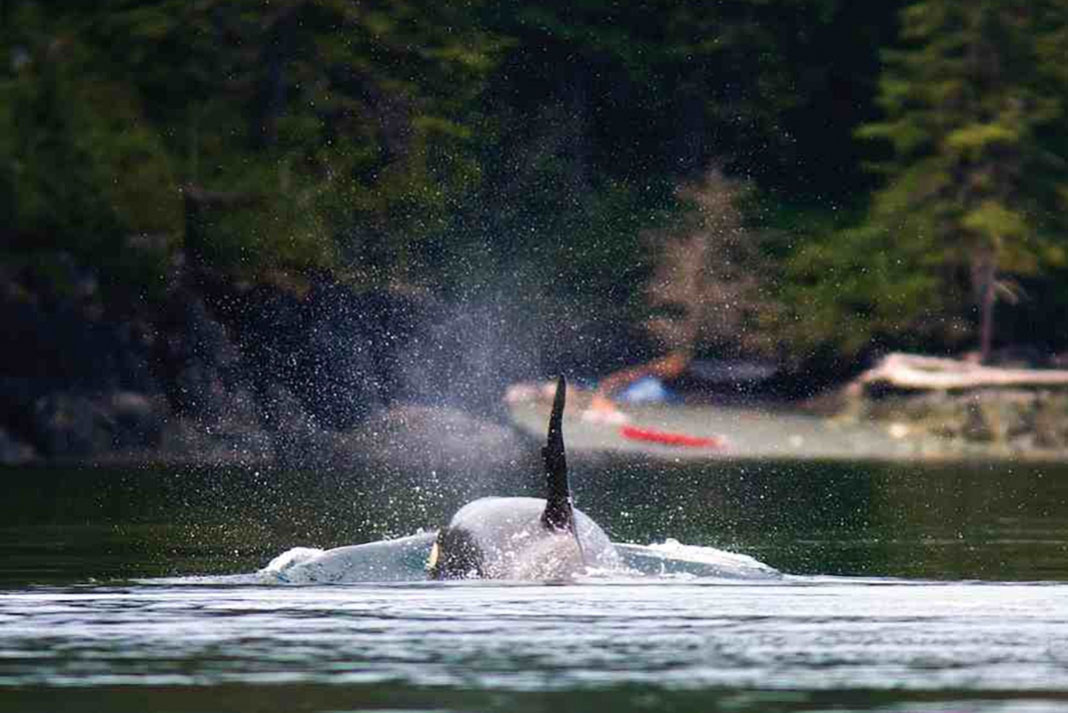Products You May Like
Nature has a way of making us feel very small sometimes, and no creature makes that point more dramatically than the mighty whale. After all, what better way to put life’s problems in perspective than watching a huge marine mammal go about its daily business? Whale watching is even more impressive from the seat of a kayak, so visit these hotspots and get a viewing experience you won’t soon forget.
Best Places to Kayak with Whales
1 Saguenay, Quebec
SPECIES: Beluga, Minke, Finback, Blue, Humpback
SEASON: July to mid-September
The Saguenay St. Lawrence National Marine Park protects two distinct components: the Saguenay Fjord with steep walled cliffs, brackish water, strong currents, 15-foot tides and ghostly white beluga whales; and the St. Lawrence River estuary with ice cold saltwater, 13-foot tides and minke, blue, finback and humpback whales.

Camp at Marine Paradise near Les Escoumins and daytrip along the St. Lawrence coast toward Les Bergeronnes (22 km) and Tadoussac (40 km), or explore the fjord from Anse de Roche. Several companies provide guided trips. Due to tidal conditions and currents, only experienced paddlers should venture on their own.
—Mike Petzold
2 Three Capes, Oregon
SPECIES: Gray
SEASON: March to August
Every winter, 18,000 gray whales head from the Bering Sea to birthing lagoons in Mexico. In March and April they truck north again, hugging the shore to protect their young from hungry great white sharks and orca. The Three Capes—Cape Meares, Cape Lookout and Cape Kiwanda—protrude into their path. During peak migration, 30 whales go by every hour.
There are no guided trips: this is exposed coastal paddling. For Meares, launch at Oceanside and paddle north; for Lookout, launch at Cape Lookout State Park and head south; for Kiwanda, launch at Pacific City and head north. Kiwanda is the friendliest; Cape Lookout, with a challenging launch and tide rips, is the most advanced.
—Neil Schulman
3 Bay Of Fundy, New Brunswick
SPECIES: Finback, Humpback, Minke, Right
SEASON: Mid-August to October
Begin your day with a half-hour ferry ride to Deer Island at the mouth of the Bay of Fundy. En route to Campobello Island’s picturesque East Quoddy Head Lighthouse, paddle among small islands sheltering perfect lunch stops.
Monstrous finback, playful humpback and diminutive minke whales feed in these waters and up close encounters aren’t uncommon. If you are really lucky, you may even see an endangered North Atlantic right whale—gentle giants whose global population numbers just 470 individuals.
After a break on Campobello, it’s back to Deer Island for the 5 p.m. ferry back to the mainland.
—Doug Scott
4 Johnstone Strait, British Columbia
SPECIES: Orca, Humpback, Minke
SEASON: July to early September
Johnstone Strait, along the northeast inside passage of Vancouver Island, is the preeminent location in North America for viewing orcas, or killer whales. During the summer salmon run, some 200 resident orcas pursue the spawning fish through the two-mile-wide strait. Launch at Telegraph Cove, where you can rent kayaks or join a guided trip from veteran outfitters like Sea Kayak Adventures and North Island Kayak.

To maximize sightings, paddle a half-day east to Kaikash Creek, keeping inside the kelp line to avoid disturbing the whales. Set up camp here for prime viewing near the Robson Bight Ecological Reserve, a no-paddle zone famous for its orca rubbing beach.
—Gary Luhm
This article was first published in the Spring 2015 issue of Adventure Kayak. Subscribe to Paddling Magazine’s print and digital editions, or browse the archives.
Johnstone Strait is the preeminent location in North America for kayaking with orcas, or killer whales. | Feature photo: Gary Luhm
